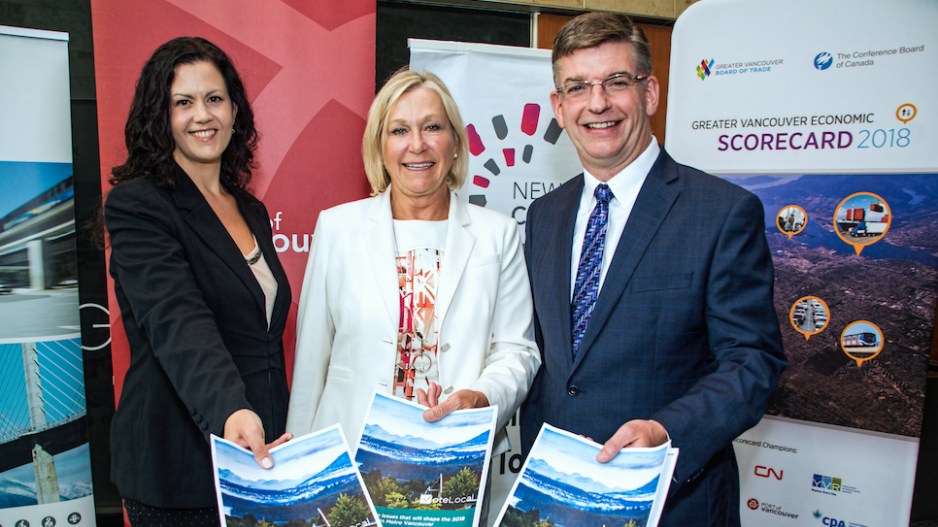Affordable housing, transportation and taxes are the top issues facing the region’s municipalities, says Greater Vancouver’s business community.
Last week, the Mustel Group and FleishmanHillard HighRoad, in partnership with the Greater Vancouver Board of Trade (GVBOT), released a handbook for local leadership candidates based on survey feedback from the region’s general public, business community and political leadership.
The report offers important insight into the issues at play in the October 20 municipal election, in which more than half of the region’s current mayors have chosen not to run.
Perhaps unsurprisingly, affordability challenges ranked high among all three groups surveyed.
However, GVBOT president and CEO Iain Black says he was surprised at the number of businesses that were considering relocation as a result of those challenges.
According to the new data, 37% of businesses, many of which are large companies, have recently considered relocating away from the Greater Vancouver region over affordability concerns.
“I think in the case of businesses, they’re feeling still that they’re paying four, five, six, in some cases seven times the ratio of property taxes that private citizens are, and they don’t have a vote,” Black said.
“Businesses are looking for their city councils to do better, to be more transparent and be accountable, and get out of the way of business.”
In total, 60% of businesses believe municipal governments are on the wrong track.
Of businesses located within the city of Vancouver, 45% cited affordable housing as a key issue, followed by taxes (14%) and transportation (10%).
The survey, which randomly sampled 533 Metro Vancouver adults, 93 politicians and 184 GVBOT members primarily based in Vancouver, also found that nearly three in four businesses claim housing costs have affected their ability to recruit and retain employees.
“We find a very high proportion of businesses are themselves thinking of relocating out of the Lower Mainland,” said Evi Mustel, owner of Mustel Group. “It’s having major economic impacts for us as well now.”
The survey results show broad general consensus among voters, businesses and politicians that housing affordability is this election’s top issue. Three-quarters of the region’s business community believe affordability has worsened over the last five years – a view 67% of residents and 82% of political leaders agree with.
Despite concern, businesses and residents have some reservations about how measures meant to address housing will affect transportation.
Fifty-two per cent of business respondents said their municipalities have permitted too much housing, and that they were concerned transit infrastructure and roads cannot support the region’s growing population. Residents were more likely to concur, with 68% believing too much housing has been given the green light.
A third of politicians agree, but another 47% believe local governments have struck the right balance between housing and transportation needs.
The results highlight one of several disconnects between voters and those who hold or are running for public office.
One is optimism around future affordability. Whereas 37% of politicians believe quality of life and affordability will improve in the next five years, just 10% and 13% of residents and businesses say the same. Sixty-two per cent and 67% of each respective group largely believes conditions will worsen, compared with 31% of civic office hopefuls.
“I think the biggest takeaway is that affordability, concerns about housing and quality of life in our region … are going to dominate the election campaign in most communities across the region,” said Anna Lilly, senior vice-president and partner at FleishmanHillard HighRoad.
“There’s the sense that there has been a lot of change and that it’s come quite fast.”
On transportation, the recent $3 billion commitment from federal and provincial governments to the Broadway Corridor SkyTrain expansion directly addresses both of businesses’ two top transportation priorities – the project specifically, and also the general expansion of regional public transit services.
When it comes to spending, businesses want to see municipalities invest first in local road maintenance and traffic management (17%), closely followed by investments in planning and permitting to enable new development (16%).
An overwhelming majority of those surveyed also want to see local governments work with the provincial government to introduce ride-hailing services to British Columbia.
“There are opportunities for more co-ordination, for the cities to work together. And there’s an appetite on the part of the population for them to do so faster and more effectively,” said Black, who added that in his view, the Evergreen Line serves as the poster child for the issue. It took two and a half years for the project to get federal and provincial funding, and another two years and eight months for the region’s Mayors’ Council to determine how to raise their share.
“The delay on that of two years, eight months, when you look at the full trains that exist right now on that Millenium Line extension, really speaks to the fact that the appetite was there for the project way sooner than it actually got off the ground,” said Black. “There’s a message there for our elected officials that the public wants them to work together, and that they’re watching.”
The third priority area for businesses across the region is taxation.
A measure of Greater Vancouver’s tax competitiveness – the region’s marginal effective tax rate – places the region last out of 17 comparable jurisdictions around the world, according to the Conference Board of Canada and GVBOT’s Scorecard 2018.
The scorecard argued this has made the region less attractive to corporate investment, though businesses surveyed recently appear divided in their views on whether Greater Vancouver’s taxes are too high.
When asked to describe local government’s tax burden on their business over the past four years, 39% of respondents called it unfair, 38% said it was reasonable and 23% were unsure. •




